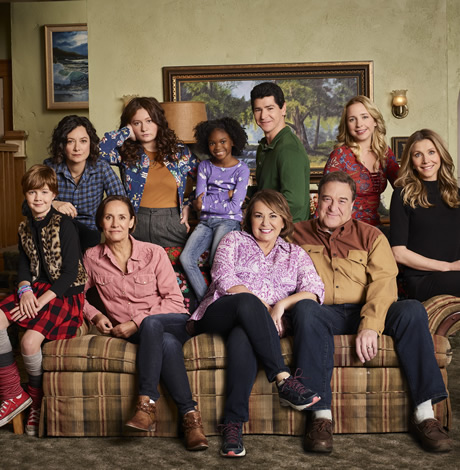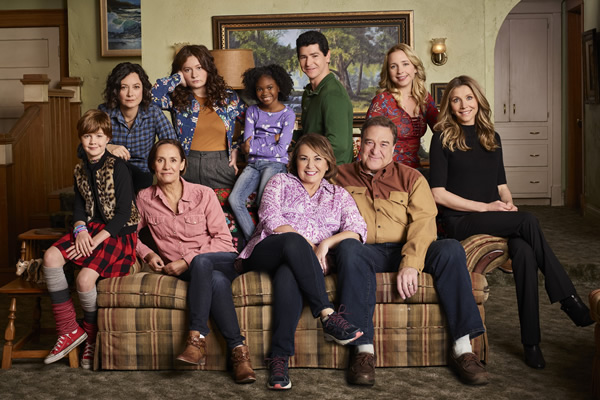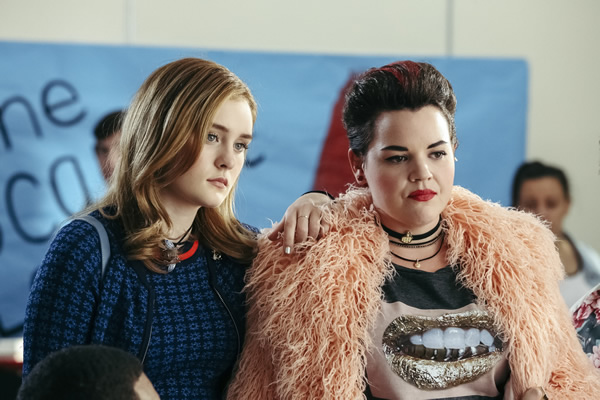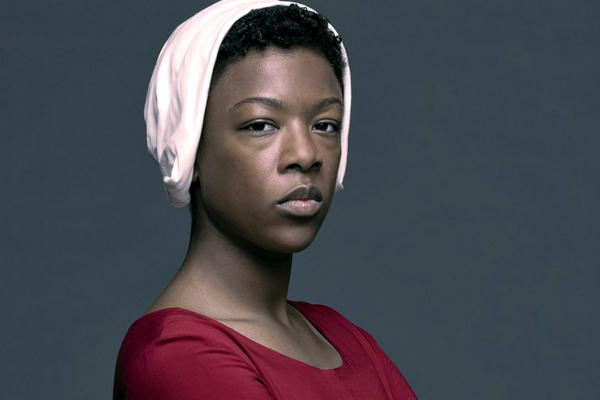Arts & Entertainment
SPRING ARTS 2018 TV: Small screen delights
‘Rise,’ ‘Roseanne’ reboot, ‘Handmaids’ return pepper TV season


The cast of the ‘Roseanne’ reboot. (Photo courtesy ABC)
The spring 2018 television season may lack some of the sparkle of last year’s schedule, but there are still some new offerings and returning favorites that LGBT TV fans may want to watch.
On March 27, the outspoken Roseanne Barr returns to network television in a continuation (season 10) of the ground-breaking show that bears her name. Most of the original cast will be back. John Goodman returns as Dan Connor (one of the show’s early promos made fun of his return from the dead). Lecy Goranson, Sara Gilbert and Michael Fishman return as the Conner children. In an interesting twist, Sarah Chalke, who briefly replaced Goranson as Becky, will return to the series as a middle-class woman who hires Becky to be her surrogate.
Many of the guest stars will also return, including Roseanne’s lesbian friend Nancy Bartlett (Sandra Bernhard), Roseanne’s African-American neighbors, Natalie West as Crystal and Johnny Galecki as David Healy. The new cast will also be rounded out by several grandchildren. It is not clear if Martin Mull and Fred Willard, whose characters were married on the show, will return.
Early reports from the set say that the series will address the support of both Roseanne Barr and Roseanne Conner for Donald Trump; the death of Becky’s husband Mark Healy — actor Glenn Quinn died in 2002; and that Roseanne’s youngest son Jerry Garcia Conner will not appear because he is “out on a fishing boat.”
“Rise” on NBC has caused controversy even before its premiere on March 13. The series is loosely based on the nonfiction book “Drama High” by Michael Sokolove which tells the true story of high school drama teacher Lou Volpe, who came as gay later in life. Some media outlets have accused producer Jeff Katims with “straight-washing” Sokolove’s book, but the Writers Guild of America has ruled that Katims should be listed as the creator of the television series, instead of saying he “developed” the show from Sokolove’s book.
The show does focus on the drama teacher, played by Jordan Roth, as a straight family man, but Katims adds several LGBT characters, including Michael (played by trans actor Ellie Desautels), a transgender student at the high school; Simon (Ted Sutherland), who is exploring his own sexuality after being cast as a gay character in the school’s production of “Spring Awakening;” and, Volpe’s married lesbian sister-in-law. The cast also includes Rosie Perez as a fellow teacher Volpe and Auli’I Cravalho (the voice of Moana) as a student.
Meanwhile on Paramount, “Heathers” will premiere on March 7. Based on the iconic 1988 movie starring Wynona Ryder, the “pitch-perfect black comedy anthology series” is set in the present day. The story still focuses on “good girl” Veronica Sawyer, along with her boyfriend JD and “the Heathers,” a vicious clique who ruthlessly control life at Westerburg High. This time, however, one of the Heathers is played by a man. Shannon Doherty, one of the cinematic Heathers, will make a guest appearance.

Veronica Sawyer (Grace Victoria Cox) and Heather Chandler (Melanie Field) in the small-screen version of ‘Heathers.’ (Photo courtesy Paramount)
On April 25, a year after the first episode of season one aired, season two of “The Handmaid’s Tale” will premiere on Hulu. The entire main cast will return, including Elisabeth Moss as June/Offred, Ann Dowd as the terrifying Aunt Lydia, openly lesbian actress Samira Wiley as June’s best friend Moira and Alexis Bledsel as the lesbian Handmaid Ofglen, who was formerly known as Emily. New cast members include Clea DuVall as Emily’s wife, openly lesbian actress Cherry Jones as June’s mother, Bradley Whitford as Commander Joseph Lawrence and Marisa Tomei.

Samira Wiley returns as Moira in season two of ‘The Handmaids Tale.’ (Photo courtesy Hulu)
Working closely with novelist Margaret Atwood, writer Bruce Miller has continued to expand the world of Gilead, a dystopian vision of the United States after a theocratic regime has taken power. Fertile women, known as Handmaidens, are forced to be surrogates for the Commanders and their infertile wives; women who resist are forced to clean up toxic waste dumps known as “the Colonies.” Details about season two are sparse, but it is known that there is a large state funeral and that some scenes are set in the horrific Colonies.
And, on April 13, Netflix will reboot a classic sci-fi series, but without an iconic character generally assumed to be gay. In the original “Lost In Space,” Dr. Zachary Smith was played by Jonathan Harris with a delicious campy flair. In a fascinating gender swap, Parker Posey take over the role of the nefarious stowaway. In another interesting casting move, Ignacio Serricchio will claim the role of Major Don West created by Mark Goddard.
In addition, several returning or continuing shows continue to include LGBT characters, although generally in supporting roles.
Season two of “Jessica Jones” returns to Netflix on March 8 (International Women’s Day). Part of the Marvel Comic Universe, the series is grounded in a feminist sensibility with strong women on both sides of the camera. The series stars Krysten Ritter, who was nominated for a Dorian Award from the LGBT critic’s group GALECA, and Carrie Anne Moss as Jones’ lesbian boss Jeri Hogarth.

‘Jessica Jones’ returns to Netflix. (Photo courtesy Netflix)
“Black Lightning,” which premiered on the CW in January, is based on the DC comic about a family of African-American superheroes. Cress Williams plays the title character and Nafessa Williams plays his daughter Anissa Pierce, a crime-fighter who is developing her superpowers under the name of Thunder.
Fox’s airline comedy “LA to Vegas” debuted in January to weak reviews and strong ratings, but it has made a star of Nathan Lee Graham who plays gay flight attendant Bernard. The openly gay actor played Miss Understanding in the original Broadway cast of “Priscilla, Queen of the Desert” and was recently presented with the Jose Esteban Munoz Award from CLAGS: the Center for LGBTQ Studies at the Graduate Center, CUNY. The award is given to an LGBT activist who promotes queer studies outside of academia.
Some of the other shows that continue to feature members of the LGBT community include “Dynasty” with Nicollette Sheridan joining the cast as Alexis; Tig Nataro on Amazon’s “One Mississippi”; the rebooted “Queer Eye for the Straight Guy”; “The Bold and The Beautiful” where Kayla Mosley heats up the set as transgender woman Maya Avant; “Supergirl”; Lena Waithe’s “Chi”; the popular ABC comedy “Modern Family” which was recently renewed for a 10th and final season (although there are talks of a spinoff); and “Grown-ish,” a spin-off of ABC’s “Black-ish.”
There’s also “Call the Midwife” (PBS), “Valor” (the CW), “Madam Secretary” (CBS), “The Fosters” (Freeform), “Riverdale” (the CW), “Portlandia” (IFC), “Grey’s Anatomy” (ABC), “How To Get Away With Murder” (ABC), “Arrow” (the CW) “One Day At A Time” (Netflix) and “Jane the Virgin” (the CW).
Books
Love or fear flying you’ll devour ‘Why Fly’
New book chronicles a lifetime obsession with aircraft

‘Why Fly’
By Caroline Paul
c. 2026, Bloomsbury
$27.99/256 pages
Tray table folded up.
Check. Your seat is in the upright position, the airflow above your head is just the way you like it, and you’re ready to go. The flight crew is making final preparations. The lights are off and the plane is backing up. All you need now is “Why Fly” by Caroline Paul, and buckle up.

When she was very young, Paul was “obsessed” with tales of adventure, devouring accounts written by men of their derring-do. The only female adventure-seeker she knew about then was Amelia Earhart; later, she learned of other adventuresome women, including aviatrix Bessie Coleman, and Paul was transfixed.
Time passed; Paul grew up to create a life of adventure all her own.
Then, the year her marriage started to fracture, she switched her obsession from general exploits to flight.
Specifically, Paul loves experimental aircraft, some of which, like her “trike,” can be made from a kit at home. Others, like Woodstock, her beloved yellow gyrocopter, are major purchases that operate under different FAA rules. All flying has rules, she says, even if it seems like it should be as freewheeling as the birds it mimics.
She loves the pre-flight checklist, which is pure anticipation as well as a series of safety measures; if only a relationship had the same ritual. Paul loves her hangar, as a place of comfort and for flight in all senses of the word. She enjoys thinking about historic tales of flying, going back before the Wright Brothers, and including a man who went aloft on a lawn chair via helium-filled weather balloons.
The mere idea that she can fly any time is like a gift to Paul.
She knows a lot of people are terrified of flying, but it’s near totally safe: generally, there’s a one in almost 14 million chance of perishing in a commercial airline disaster – although, to Paul’s embarrassment and her dismay, it’s possible that both the smallest planes and the grandest loves might crash.
If you’re a fan of flying, you know what to do here. If you fear it, pry your fingernails off the armrests, take a deep breath, and head to the shelves. “Why Fly” might help you change your mind.
It’s not just that author Caroline Paul enjoys being airborne, and she tells you. It’s not that she’s honest in her explanations of being in love and being aloft. It’s the meditative aura you’ll get as you’re reading this book that makes it so appealing, despite the sometimes technical information that may flummox you between the Zen-ness. It’s not overwhelming; it mixes well with the history Paul includes, biographies, the science, heartbreak, and exciting tales of adventure and risk, but it’s there. Readers and romantics who love the outdoors, can’t resist a good mountain, and crave activity won’t mind it, though, not at all.
If you own a plane – or want to – you’ll want this book, too. It’s a great waiting-at-the-airport tale, or a tuck-in-your-suitcase-for-later read. Find “Why Fly” and you’ll see that it’s an upright kind of book.
The Blade may receive commissions from qualifying purchases made via this post.
Theater
Out actor Kevin Cahoon on starring role in ‘Chez Joey’
Arena production adapted from Broadway classic ‘Pal Joey’

‘Chez Joey’
Through March 15
Arena Stage
1101 Sixth St., S.W.
Tickets start at $93
Arenastage.org
As Melvin Snyder in the new musical “Chez Joey,” out actor Kevin Cahoon plays a showbiz society columnist who goes by the name Mrs. Knickerbocker. He functions as a sort of liaison between café society and Chicago’s Black jazz scene circa 1940s. It’s a fun part replete with varied insights, music, and dance.
“Chez Joey” is adapted from the Broadway classic “Pal Joey” by Richard Rodgers and Lorenz Hart. It’s inspired by John O’Hara’s stories based on the exploits of a small-time nightclub singer published in The New Yorker.
A warm and humorous man, Cahoon loves his work. At just six, he began his career as a rodeo clown in Houston. He won the Star Search teen division at 13 singing songs like “Some People” from “Gypsy.” He studied theater at New York University and soon after graduating set to work playing sidekicks and comedic roles.
Over the years, Cahoon has played numerous queer parts in stage productions including “Hedwig and the Angry Inch,” “La Cage aux Folles,” “Rocky Horror” as well as Peanut in “Shucked,” and George the keyboardist in “The Wedding Singer,” “a sort of unicorn of its time,” says Cahoon.
Co-directed by Tony Goldwyn and the great Savion Glover, “Chez Joey” is a terrific and fun show filled with loads of talent. Its relevant new book is by Richard Lagravenese.
On a recent Monday off from work, Cahoon shared some thoughts on past and current happenings.
WASHINGTON BLADE: Is there a through line from Kevin, the six-year-old rodeo clown, to who we see now at Arena Stage?
KEVIN CAHOON: Anytime I want to land a joke in a theater piece it goes back to that rodeo clown. It doesn’t matter if it’s Arena’s intimate Kreeger Theatre or the big rodeo at the huge Houston Astrodome.
I was in the middle stadium and there was an announcer — a scene partner really. And we were doing a back and forth in hopes of getting laughs. At that young age I was trying to understand what it takes to get laughs. It’s all about timing. Every line.
BLADE: Originally, your part in “Chez Joey” Melvin was Melba who sings “Zip,” a clever woman reporter’s song. It was sort of a star feature, where they could just pop in a star in the run of “Pal Joey.”
CAHOON: That’s right. And in former versions it was played by Martha Plimpton and before her Elaine Stritch. For “Chez Joey,” we switched gender and storyline.
We attempted to do “Zip” up until two days before we had an audience at Arena. Unexpectedly they cut “Zip” and replaced it with a fun number called “I Like to Recognize the Tune,” a song more connected to the story.
BLADE: Wow. You must be a quick study.
CAHOON: Well, we’re working with a great band.
BLADE: You’ve played a lot of queer parts. Any thoughts on queer representation?
CAHOON: Oh yes, definitely. And I’ve been very lucky that I’ve had the chance to portray these characters and introduce them to the rest of the world. I feel honored.
After originating Edna, the hyena on Broadway in “The Lion King,” I left that to do “Hedwig and the Angry Inch” as standby for John Cameron Mitchell, doing one show a week for him.
Everyone thought I was crazy to leave the biggest musical of our time with a personal contract and getting paid more money that I’d ever made to get $400 a week at the downtown Jane Street Theatre in a dicey neighborhood.
At the time, I really felt like I was with cool kids. I guess I was. And I never regretted it.
BLADE: When you play new parts, do you create new backstories for the role?
CAHOON: Every single time! For Melvin, I suggested a line about chorus boys on Lakeshore Drive.
BLADE: What’s up next for Kevin Cahoon?
CAHOON: I’m about to do the New York Theatre Workshop Gala; I’ve been doing it for nine years in a row. It’s a huge job. I’ll also be producing the “Cats: The Jellicle Ball” opening on Broadway this spring; it’s a queer-centric uptown vogue ball with gay actor André de Shields reprising his role as “Old Deuteronomy.”
BLADE: There’s a huge amount of talent onstage in “Chez Joey.”
CAHOON: There is. I’m sharing a dressing room with Myles Frost who plays Joey. He won accolades for playing Michael Jackson on Broadway. We’ve become great friends. He’s a miracle to watch on stage. And Awa [Sal Secka], a D.C. local, is great. Every night the audience falls head over heels for her. When this show goes to New York, Awa will, no doubt, be a giant star.
BLADE: Do you think “Chez Joey” might be Broadway bound?
CAHOON: I have a good feeling it is. I’ve done shows out of town that have high hopes and pedigree, but don’t necessarily make it. “Chez Joey” is a small production, it’s funny, and audiences seem to love it.

The Capital Pride Alliance held the annual Pride Reveal event at The Schuyler at The Hamilton Hotel on Thursday, Feb. 26. The theme for this year’s Capital Pride was announced: “Exist. Resist. Have the audacity!”
(Washington Blade photos by Michael Key)











































